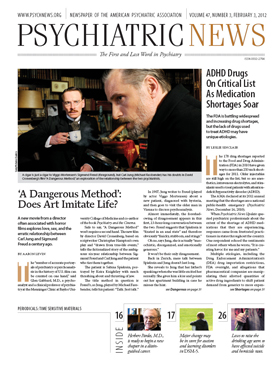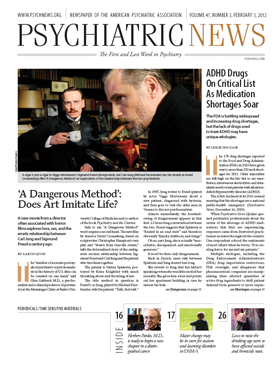Experience is the best teacher, the saying goes.
This sentiment is heartily endorsed by scores of chief psychiatry residents who have attended the annual Tarrytown Leadership Conference, which attracts chief psychiatry residents from the United States and Canada each year.
During the three-day conference, residents participate in small- and large-group exercises that simulate some of the situations they will encounter as chief residents and emphasize not so much the tasks they will need to undertake, but the manner in which they carry out the tasks as leaders in their residency programs.
The conference is run out of the Continuing Medical Education Center at Montefiore Medical Center.
“I attended the seminar as a chief resident in 1978,” Bruce Schwartz, M.D., told Psychiatric News, “and the meeting remains indelibly burned in my memory—I would say that it’s life-changing.”
Schwartz is a professor of psychiatry at Albert Einstein Montefiore Medical Center and program director of the leadership seminar.
Schwartz estimates that more than 4,000 chief residents or would-be chief residents in psychiatry have attended the conference since it began in 1972. Approximately 100 chief residents attend the conference annually.
To quantify the perceived benefits of the meeting by attendees, he surveyed 356 participants who attended the meeting as chief residents from 1998 to 2010 and found that 91 percent endorsed the meeting as an important part of their residency training and said that they would recommend the conference to others.
Additional survey findings showed that before the conference, 54 percent of the residents had moderate to high confidence in their leadership abilities, but after the conference, 87 percent did.
According to Andrea Weiss, M.D., who is deputy director of residency training for the Department of Psychiatry and Behavioral Sciences at Albert Einstein College of Medicine and Montefiore Medical Center, the crux of experiential learning happens in the small-group exercises.
“Attendees are able to examine many aspects of their leadership styles pertaining to conflict avoidance and resolution, aggression, competition, nurturing, and establishing boundaries,” Weiss said. She added that the conference provides excellent networking opportunities for residents, many of whom stay in touch long after the conference ends.
Weiss attended the conference in 1987 to prepare for her role as chief resident in the emergency rooam at Jacobi Medical Center and today helps run the conference.
T. Byram Karasu, M.D., was a chief psychiatry resident at Yale in 1968 when he was tapped by Jack Wilder, M.D., to run a model clinical program at Albert Einstein.
Karasu and Wilder met monthly with five chief residents from Albert Einstein to discuss the model program, but gradually, he said, the meetings became about the residents’ concerns and frustrations. “We found ourselves mediating discussions among the chief residents, who wanted to explore with one another their conflicted roles.” As chief residents, he explained, they were no longer merely trainees, but they weren’t faculty either. These residents suddenly had to address conflict among their colleagues, or between residents and faculty, and wanted to speak with one another about the best ways to resolve such conflicts, he noted.
Karasu is the Silverman Professor and chair of the Department of Psychiatry and Behavioral Sciences at Albert Einstein College of Medicine and psychiatrist-in-chief at Montefiore Medical Center.
Wilder, who died in 1998, was a professor of psychiatry at Albert Einstein and founded the Soundview-Throgs Neck Community Mental Health Center in 1967. The program provided outpatient services for area residents with chronic mental illness who would otherwise have been hospitalized on a long-term basis and was considered to be one of the first model community health centers at the time.
Karasu and Wilder recognized the value of such discussions, so they extended the meetings to include chief residents throughout New York City psychiatry departments, and the following year they opened the conference to chief residents from all programs in the United States and Canada.
“At the height of financial good times, we had around 130 chiefs attending the meeting, and 20 faculty to run the conference,” Karasu said.
Fewer faculty have been actively involved in the meeting in recent years, but the impact of the meeting is no less powerful, Karasu acknowledged.
The seminar is “an exciting, dynamic, and emotionally charged learning opportunity that comes along once in a lifetime for chief residents,” remarked Weiss, “It is a gift to be involved each year as a faculty member—I, too, am personally enriched by the weekend.”



